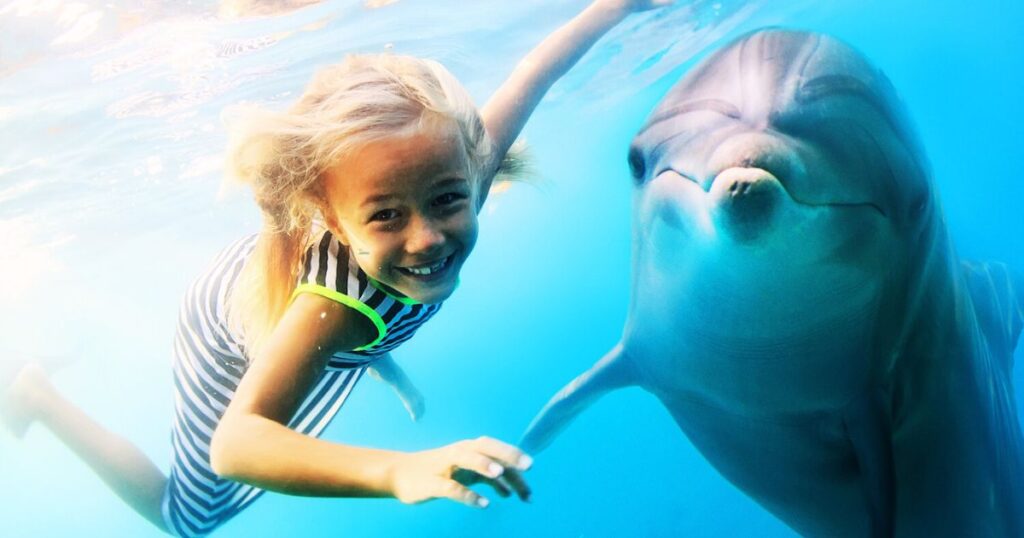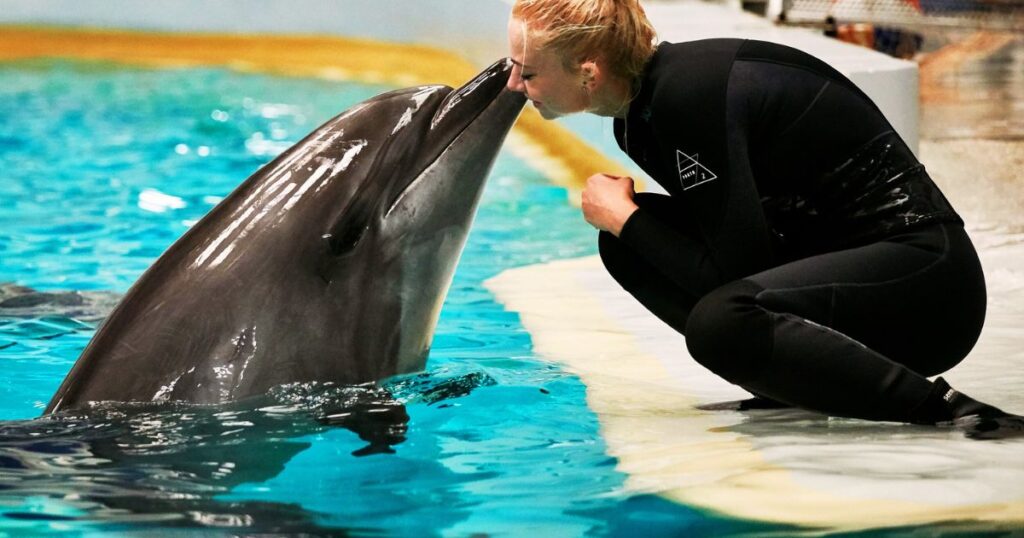Last updated on July 1st, 2024 at 12:13 pm

Do Dolphins Know What Humans Are? Since humans are intelligent and can learn from their interactions, dolphins probably perceive humans as unique entities, though their precise perception is yet unknown.
Dolphins’ amazing powers, intelligence, and social complexity have always captivated human curiosity. They are extremely intelligent and gregarious marine mammals with a level of cognitive capacity that begs the question of how they perceive the world.
I find it interesting to wonder if dolphins distinguish humans from other species. This article delves into the intricacies of dolphin cognition and investigates the implications of research about their comprehension of humans.
Table of Contents
- 1 Dolphin Intelligence and Social Structure
- 2 Communication and Interaction
- 3 Recognition of Humans: Do Dolphins Know What Humans Are?
- 4 Research Findings
- 5 The Role of Environment and Experience
- 6 Implications and Future Research
- 7 FAQs: Do Dolphins Know What Humans Are?
- 7.1 Do Dolphins Understand Humans?
- 7.2 How Do Dolphins View Humans?
- 7.3 Are Dolphins Friendly to Humans?
- 7.4 Why Do Dolphins Like Humans?
- 7.5 Are Dolphins Friendly or Dangerous?
- 7.6 Do Dolphins Know What Humans Are Called?
- 7.7 Do Dolphins Know What Humans Are Compared to Humans?
- 7.8 Do Dolphins Like Humans Sexually?
- 8 Conclusion: Do Dolphins Know What Humans Are?
Dolphin Intelligence and Social Structure
Within the animal kingdom, dolphins are unique due to their remarkable intelligence and intricate social structures.
Animals such as bottlenose dolphins have an astounding variety of behaviors that highlight their cognitive capacities. Problem-solving, teamwork, communication, and social connection are some of these characteristics.
They are among the marine mammals with the largest brains in relation to their bodies, and they have a high degree of encephalization or the ratio of brain size to body size. This implies the ability to engage in complex cognitive processes.
Studies have shown anatomical similarities between human and dolphin brains, especially in areas linked to higher-order cognitive processes like memory, self-awareness, and social cognition.
Dolphins establish complex social networks that are defined by dynamic and flexible relationships. Pods, which vary in size based on the species and surrounding conditions, might contain a few individuals or several dozen.
Dolphins display sophisticated social activities in these pods, such as working together to hunt, raise young, and fend off predators. These actions point to a high level of social intelligence and the capacity to handle tricky social situations.

Communication and Interaction
Dolphin’s social life is centered on communication. Dolphins use a wide range of vocalizations, such as clicks, whistles, and pulsing noises, to communicate with one another. [Do Dolphins Know What Humans Are?]
These vocalizations accomplish a number of tasks, such as conveying emotions, forming social relationships, and coordinating collective movements.
Dolphins use body language, such as posture, gestures, and tactile contact, in addition to vocalizations to communicate.
Within dolphin groups, these non-verbal cues are essential for information transmission and social cohesion maintenance.
Dolphins are extremely gregarious creatures, creating close relationships within their social circles. Cooperative activities like play, grooming each other, and sharing caregiving duties strengthen these links.
Dolphins can work well as a group since they frequently swim in unison and use coordinated hunting techniques while they’re in the wild.
Dolphins frequently show curiosity while dealing with humans, and they may approach boats or swimmers to examine.
These contacts give humans and dolphins the chance to engage in fun interactions as well as cross-species communication. [Do Dolphins Know What Humans Are?]
According to certain studies, dolphins may even show signs of comprehending human gestures and reacting to directions from human researchers or trainers.
See Also: Why Are Dolphins Evil To Humans? Unraveling the Darkness

Recognition of Humans: Do Dolphins Know What Humans Are?
Whether dolphins perceive humans as unique beings is one of the fascinating problems in the field of dolphin cognition research.
Although it’s difficult to pinpoint the precise nature of dolphin awareness, research has shown that they can distinguish between members of their own species as well as those from different species.
According to research, dolphins are able to recall certain individuals and differentiate between them based on traits including appearance, behavior, and past contacts.
For instance, captive dolphins frequently develop relationships with their trainers and react differently to known trainers than to unknown ones.
Similar to this, depending on their prior interactions with humans, wild dolphins may show differing degrees of comfort and curiosity. [Do Dolphins Know What Humans Are?]
The capacity to identify and react to people implies a degree of cognitive adaptability and social consciousness that surpasses the confines of the dolphin community.
Although dolphins might not be fully cognizant of human identity or culture, their ability to recognize individuals suggests a level of perceptual intelligence that makes interacting with people easier in a variety of situations.

Research Findings
Researchers studying dolphin cognition have carried out studies to examine how dolphins view and communicate with people.
A noteworthy study that was released in the journal Animal Cognition provided insight into how dolphins recognize humans.
Researchers found that dolphins responded differently to humans they had previously interacted with than they did to strangers.
This difference in response suggests that dolphins are cognitively capable of making connections and identifying certain human persons based on previous contacts.
This discovery emphasizes how sophisticated dolphin cognition is and raises the possibility that they are able to recognize and remember specific individuals.
These skills point to sophisticated social cognition and could be a factor in the intricate social dynamics seen in dolphin populations. [Do Dolphins Know What Humans Are?]
This study also establishes the foundation for future research on interspecies relationships by highlighting the possibility of human-dolphin comprehension and communication.
See Also: Do Dolphins Remember Humans? In the Depths of Memory
The Role of Environment and Experience
Dolphins’ ability to recognize humans may also be impacted by their past experiences and the surrounding environment. Dolphins kept in captivity, such as those in research facilities or marine parks, frequently come into contact with people.
As such, they might form stronger bonds with people than they would with their wild counterparts. In order to increase their comfort level and familiarity with human presence, these captive dolphins frequently participate in training sessions and interaction programs with their human caregivers.
Conversely, wild dolphins living in human-populated coastal areas may also display behaviors that indicate they recognize and are curious about humans.
Even though they don’t often interact directly, these dolphins may come into contact with people via tourism, fishing, or boating. [Do Dolphins Know What Humans Are?]
These interactions give them the chance to observe, learn, and socialize, which broadens their perspective on people’s presence and conduct.
Contextualizing study findings and interpreting observed behaviors require an understanding of the impact of environment and experience on dolphin-human interactions.
It emphasizes how adaptive dolphin cognition is and how crucial it is to take ecological considerations into account while researching interactions between different species.
Implications and Future Research
There are major ramifications for conservation, animal welfare, and our comprehension of animal cognition from the study of dolphin perception and human contact.
By acquiring knowledge on how dolphins view and react to humans, scientists can guide conservation initiatives that safeguard dolphin populations and their environments.
Enhancing the well-being of captive dolphins in controlled settings can also be achieved by taking into account their cognitive and emotional requirements.
Moreover, researching dolphin-human interactions offers important insights into the complexity of relationships and communication across different species. [Do Dolphins Know What Humans Are?]
Future studies in this field might examine the mechanisms—such as sensory signals, memory functions, and social learning—that underlie dolphin recognition of humans.
Furthermore, research on the setting, individual variations, and cultural transmission that impact dolphin-human interactions can help us better understand the dynamics that shape these connections.
FAQs: Do Dolphins Know What Humans Are?
Do Dolphins Understand Humans?
Although the whole amount of dolphins’ comprehension is unknown, evidence indicates that they are able to identify specific individuals and exhibit behaviors that show some degree of knowledge of human presence and contact.
How Do Dolphins View Humans?
Dolphins probably think of humans as different creatures that they can communicate with. Depending on their upbringing and prior experiences, they could see people as possible sources of play, social connection, or even nourishment.
Are Dolphins Friendly to Humans?
Dolphins frequently approach boats in a pleasant manner, engage in playful activities, and show interest about humans. But since each dolphin is unique, care should always be used when engaging with wild dolphins.
Why Do Dolphins Like Humans?
Dolphins may be attracted to people because to social attraction, curiosity, or happy memories from the past, such as being given food rewards by people when they were in captivity. Their intelligence and natural sociability probably contribute to their amicable encounters.
Are Dolphins Friendly or Dangerous?
With very few recorded instances of violence toward humans, dolphins are typically thought to be sociable animals. As with any wild animal, though, contact with dolphins should be handled carefully and with consideration for their limits and natural habits.
Do Dolphins Know What Humans Are Called?
Whether dolphins understand human names or labels is unknown. Their comprehension of human language is restricted, even if they might connect specific sounds or gestures with human presence or engagement. [Do Dolphins Know What Humans Are?]
Do Dolphins Know What Humans Are Compared to Humans?
Based on their capacity to identify specific humans and their activities, dolphins most likely believe that humans are different from both themselves and other animals. Their level of knowledge of human biology, psychology, or culture is still unknown, though.
Do Dolphins Like Humans Sexually?
There is no proof that dolphins have a particular sexual preference for people, despite the fact that they are recognized for their sophisticated social behaviors, which include sexual encounters. Any sexual activity aimed toward people that has been observed is probably not the product of true desire, but rather of social curiosity or misdirected mating behavior.
Conclusion: Do Dolphins Know What Humans Are?
Although there is still much to learn and argue about the specifics of dolphin perception when it comes to people, there is evidence suggesting they are cognitively capable of differentiating between humans.
Dolphins have social behavior, communication, and association-forming abilities that indicate a level of awareness that beyond that of other animals.
We get a greater understanding of the complexity of the interactions between people and animals in the natural environment as well as the diversity of these interesting marine creatures’ cognitive worlds as we continue to research and learn from them.

Mr. Das, a certified pharmaceutical scientist, holds a Bachelor of Science in Pharmaceutical Sciences and passionately contributes to dolphin conservation as a member of the committee in Bangladesh.


